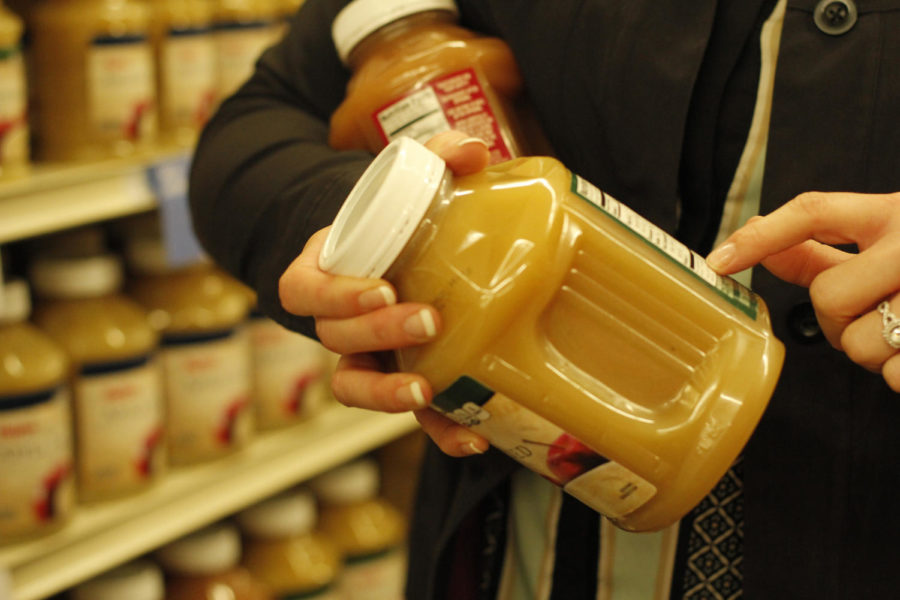A delicious opportunity for students
Kennedy DeRaedt/Iowa State Daily
She suggests adding sugar to foods instead of buying the foods with sugar already added.
March 14, 2016
Wander into McKay 206 and 210 on Tuesdays and Thursdays, there’s something pretty tasty cooking up in the classroom.
In Food Product Development 412, students go from formulation to processing to commercialization of a unique product they develop themselves. This semester, there are 11 products made by teams of 3-4 students.
For 20 years, the course has been taught at Iowa State, and in those years they’ve evolved into more complex products. Iowa State faculty members Lester Wilson and Ken Prusa currently teach the course and see how this course helps the students prepare for the future.
“My biggest goal each year is to have successful students,” said Prusa, a professor in food science and human nutrition.
Students have had success, with some products sold to companies in the industry at the end of the project. That’s not the end goal of the class, it’s meant to give students the experience needed to hit the ground running after graduation.
Abby Sparks, a senior in food science, noted the similarities between the class and internships in the field.
“I had an internship last summer that was ran similar to this class, and I know that it means this class is getting me ready for post-graduation,” Sparks said.
Sparks, along with 3 other students, are working to make a popcorn and chickpea bite snack. A lot of the class is self-motivated, they said.
Usually in the industry it would take a year to develop a new product, but here you’re given one semester and 7 hours a week. Students say it’s stressful and you have to be committed.
Each student group has to justify the demand for their product in the industry at the beginning of the project and the professors spend time talking about recent food trends in class to help give them ideas.
“They have to provide information that proves there is a credible market for this product,” said Wilson, a university professor in food science and human nutrition.
Recent food trend examples are chickpeas, from the rise of nut-free products, avocados and sweet potatoes, which caters to healthier ingredients.
Industry representatives visit the class twice, once in February and the second time during Dead Week, which is the last week of April. They give constructive criticism to the students and other suggestions to make the product better.
The “Foodtastic Three” team are creating an avocado cream cheese bagel without a hole that comes ready to serve from the microwave. They’ve been experimenting with the texture of the filling by using different types of cream cheese. They’ve hit the commercialization of the product, where they switch to industrialized ingredients.
Prusa said some are local, but other representatives fly in for the presentations, and tells his students to “treat this like a job interview.” Although many students have jobs lined up, others do not and they may secure a job by impressing an industry representative at the final presentation.
Along with food science majors, this class also interests culinary science and meat science majors. The skills they learn through the class can transfer to other jobs in other aspects of the industry, and the class experience makes them more marketable while searching for a job.
Kendall Ryan, a senior in food science, who made a mango flavored gazpacho with her teammates, said she hopes their product will “get people to try new things.”
Gazpacho is typically made with all vegetables and adding mango gives their product a fresh new edge. Calling themselves “Fresco Ole” they’ve experimented with one of the final obstacles, which is packaging.
Packaging is one of the areas that Prusa sees expansion in the future. Right now, they work with students in the College of Design to create an aesthetically pleasing label but in the future, he sees higher involvement with the packaging.
With newer technologies, he predicts larger audiences for marketing testing due to sites like SurveyMonkey and other online polls that they could utilize to access more students.
After their final presentation with the industry during dead week and before graduation, they’ll have a poster board Session, explaining their process and samples available during Finals Week in McKay Hall. For a tasty and unique break from your studies, stop by. And who knows? You might just be chowing down on the next big thing for food.
















